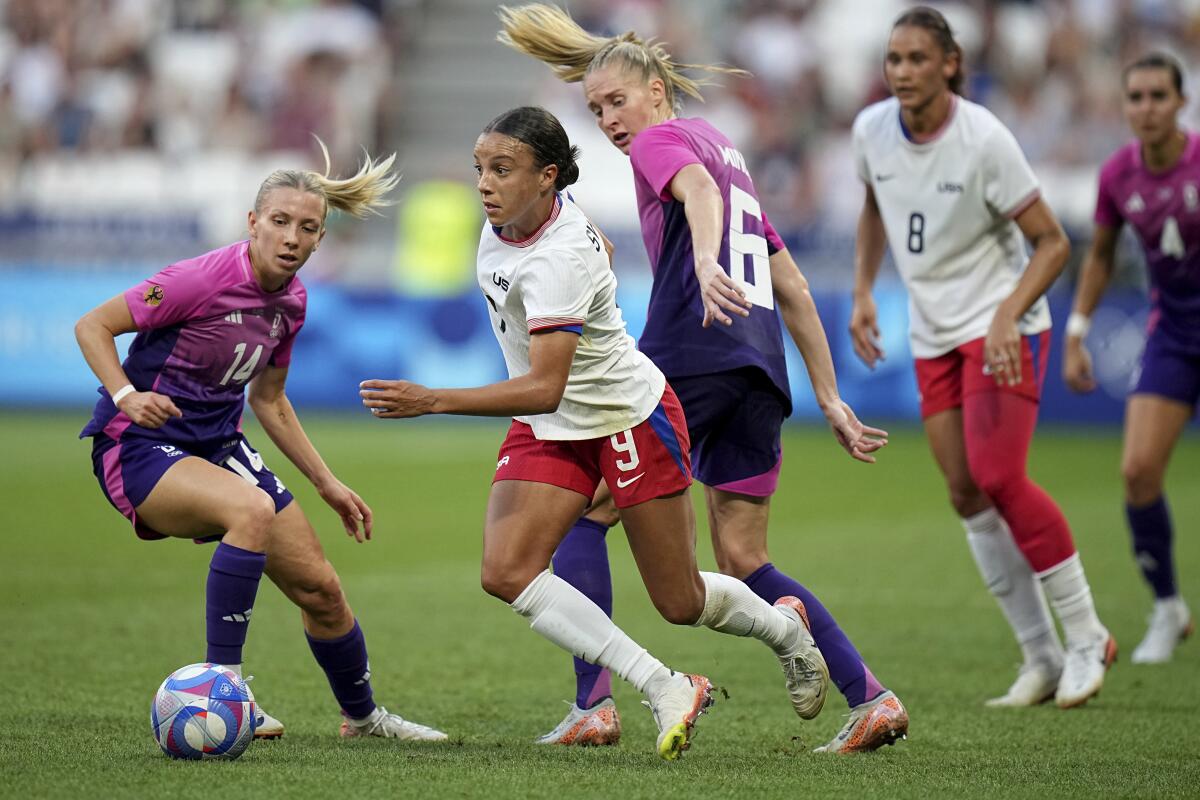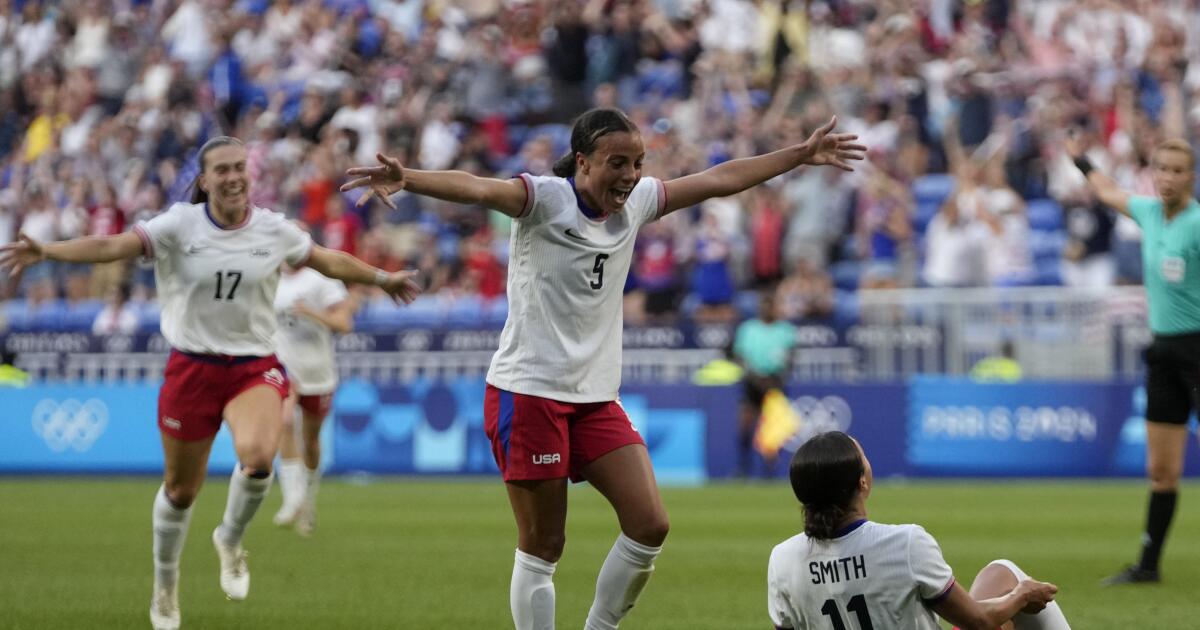DECINES-CHARPIEU, France — In the last eight weeks, Emma Hayes has managed to do what the previous two coaches of the women’s national soccer team couldn’t do in the last eight years, which is get the U.S. to the gold-medal match in the Olympic Games.
But it wasn’t easy, with the Americans needing a goal from Sophia Smith in extra time Tuesday to turn back Germany 1-0 before a sparse crowd at Stade de Lyon. That sends the U.S. on to the final of the Paris Olympics on Saturday against Brazil, which upset reigning World Cup champion Spain in the second semifinal.
2024 Paris Summer Olympic Games
And fittingly the Americans’ biggest win under Hayes came a year to the day after their most crushing defeat, a penalty-kick loss to Sweden in the round of 16 of last summer’s World Cup.
“We had a tough year last year in every way possible,” Smith said. “But I feel like this is a new year, and we’re really just showing the world that we didn’t we didn’t ever drop off. We just needed a learning year and a growth year.
“This team is so special. We’re young and we’re just finding ways to win games.”
The Olympic final was once considered the domain of the U.S., which played for the gold in each of the first five women’s tournaments, winning four of them. But the last trip came in 2012, with the U.S. losing in the quarterfinals in Rio de Janeiro and in the semifinals in Tokyo.
Hayes got them back there in just her eighth game as coach.
“We’re a different team since she’s come in,” Smith said. “She’s so hilarious and chill and funny, and I feel like that’s exactly what we needed. We have the players, we have the talent. We just needed someone to come in and believe in us and put us in the best position to succeed. … Emma’s doing exactly that.”
Goalkeeper Alyssa Naeher, who preserved the win by making a kick save, her seventh of the night, on Laura Freigang’s header in the final minute, agreed.
“I don’t know really how to describe it, but she’s got this energy about her, this kind of this persona about her,” said Naeher, who has given up just one goal in her last 398 minutes “She’s able to relate and connect to the players. Anytime there’s change, it’s always a bit refreshing just to make that transition. You can see everyone’s buying in to her.
“She’s just the kind of coach that you want to play for, you want to compete for. You can feel that she’s in your corner.”

American Mallory Swanson drives the ball next to Germany’s Elisa Senss and Janina Minge during a 2024 Summer Olympics semifinal soccer match Tuesday at Lyon Stadium in Decines, France.
(Laurent Cipriani / Associated Press)
For Hayes it’s been a learning process, one that’s far from complete. Furthering that education, she said, is one reason why she’s stayed with a set lineup and made few substitutions despite the fact the U.S. has played five games in four cities during a 13-day stretch in the heat and humidity of the French summer. And the last two games have gone to extra time.
Hayes said she showed the team a documentary about ultramarathoner Courtney Dauwalter before Tuesday’s game to steel the players for the challenge ahead.
“She talks about a pain cave and how big her pain cave is,” Hayes said of Dauwalter. “I could see today that players are having to dig to the deepest place within them. The reason I want to play the team together for as long as possible is because I want them to develop that. I want them to have that moment, because I do not believe you can win without it. I haven’t had long enough with this group to get that.
“I want to see who they are when it’s hot. I want them to suffer. And I thought we suffered a hell of a lot today.”
Smith, one of eight players who have averaged more than 86 minutes a game in France, said she and many of her teammates were playing on dead legs against a German team missing its two best players, captain Alexandra Popp, who was out because of an illness, and leading scorer Lea Schuller, who had an inflamed tendon in her left knee.
“People don’t know how hot it is down there, how tired our legs are after playing 120 minutes and 120 minutes,” Smith said. “It’s hard, but it’s so worth it. We just have to empty the tank every single game.”
“I don’t know, find a way,” she added. “Find a way.”
Smith did just that Tuesday, combining with Mallory Swanson for the only goal five minutes into the first 15-minute overtime. The sequence began with Sam Coffey playing a ball to Swanson just past the center circle. After taking a touch, Swanson pushed a deft, right-footed pass into the penalty area for Smith, who feigned to the inside, then went to the outside to shed German defender Felicitas Rauch before sliding to the turf and lifting a right-footed shot over keeper Ann-Katrin Berger.
Smith said she felt relief and happiness when the ball went in. But also fatigue, which muted the celebration of her third goal in the tournament.
“I just couldn’t run to anybody,” Smith said.
Hayes, who also looked exhausted when it was over, said last summer’s disappointing World Cup has been key to getting the team to the gold-medal game.
“When you have a team that wins a lot, it’s a lot harder to get them to another finish line,” she said. “The first thing I noted about this group [is] they’re hungry. They’re ambitious.
“They’re gonna pull together in a hard moment. And all I kept thinking was the game’s getting harder, dig harder. Suffer for a little bit longer. Listen, this is top level.”
And on Saturday, if the U.S. gets back to the top level of the Olympic medal podium for the first time in a dozen years, all that suffering will have been worth it.

